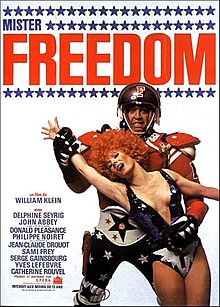- Mr. Freedom
-
For London pop art fashion store Mr Freedom (1969-72), see Tommy Roberts (designer).
Mr. Freedom 
Film posterDirected by William Klein Release date(s) 1969 Running time 95 minutes Country France Language English / French Mr. Freedom is a 1969 film by American expatriate photographer and filmmaker William Klein. In addition to starring popular French actor Delphine Seyrig, this anti-imperialist satirical farce features cameos by well-known actors Donald Pleasence and Philippe Noiret, as well as musician Serge Gainsbourg.[1]
Contents
Plot
Under the command of Dr. Freedom, crass superhero Mr. Freedom (John Abbey) goes to France to stave off the advances of the mysterious French Anti-Freedom (FAF) organization. He joins forces with the femme fatale Marie-Madeleine to lead his own anti-communist Freedom organization. The Freedom mission is complicated by the machinations of communist foes — the Stalinist Moujik Man and the ferocious Maoist Red China Man (portrayed as a giant inflatable dragon). France, refusing to see the FAF as a threat, rebuffs Freedom, leading to an escalation of Cold War tactics. In the end, betrayed, Mr. Freedom destroys himself trying to save the "unappreciative" nation.
Style
Like his previous film, Who Are You, Polly Magoo?, and reminiscent of the feel of much of Zazie in the Metro, in which Klein is credited as artistic consultant, Mr. Freedom features absurd characters, comical costuming, and exaggeration. The title character's uniform is an odd assemblage of discarded football gear, face paint, and hockey gloves. The United States Embassy is a department store run by skipping models in spandex, proffering right-wing mercenaries and "Freedom Kits" of high-tech weaponry. Freedom training sessions are Dantian visions of rape and sadism. Every scene aims for the absurd, reaching both for comedic effect and political statement.
Politics
Filmed at the height of the Vietnam War and concurrently with the radical political upheaval of 1968 France, Mr. Freedom is a political farce, clearly sympathizing with national liberation and left wing movements. The title character, a stand-in for U.S. political and economic might, is a crude, cruel buffoon in the service of corporations. His rhetoric of freedom stands in cold relief to his actions, which are anything but democratic. The politics get a bit muddled with the characters of Mujick Man, Red China Man, and the FAF, but they would seem to be stand-ins for the Soviet Union, communist China, and the radical milieu of the 1968 uprisings, respectively. Mr. Freedom makes numerous left wing statements on the Cold War, and more specifically, the Vietnam War.
Reception
The film was widely taken to be about the student uprising and near revolution of May 1968 in France. Klein denied this, claiming that it was more a film about America. His assertion is supported by the chronology of the film's production: In May 1968 shooting was nearly wrapped up, although documentary images of marches and clashes of May were included in the final production. Nevertheless, its implicit critique of Charles de Gaulle and sympathy with the radical students tied the release of Mr. Freedom up with French censors. Fearing it may never be seen otherwise, Klein showed the film at the 1968 Avignon Festival. Marxist-Leninist groups criticized the political caricatures of Red China Man and other characters.[2] Never receiving the widespread attention of other films released immediately post-1968, Mr. Freedom remains an obscure film.
Cast
- Delphine Seyrig — Marie-Madeleine
- John Abbey — Mr. Freedom
- Donald Pleasence — Dr. Freedom
- Jean-Claude Drouot — Dick Sensass
- Serge Gainsbourg — M. Drugstore
- Yves Lefebvre
- Rufus — Freddie Fric
- Sabine Sun
- Rita Maiden — Herself
- Colin Drake
- Pierre Baillot
- Raoul Billerey
- Philippe Noiret — Moujik Man
- Sami Frey — Christ
- Catherine Rouvel — Marie-Rouge
- Monique Chaumette — Marie
- Odile Astie — (as Odile Astier)
- Albert Augier
- Jean-Luc Bideau — Un combatant (as J.L. Bideau)
- Jean-Claude Bouillaud — (as J.C. Bouillaud)
- Michel Creton
- Guy D'Avout
- Albert Dray
- Marcel Gassouk
- Michèle Loubet
- Henry Pillsbury
- Hugues Quester
- Eric Wasberg
- Daniel Cohn-Bendit — Himself (uncredited)
- Yves Montand — Capt. Formidable (uncredited)
- Simone Signoret — Cameo appearance (uncredited)
References
- ^ Mr. Freedom at the Internet Movie Database
- ^ Smith, Alison. French Cinema in the 1970s: Echoes of May. Manchester: Manchester University Press, 2005
External links
- Mr. Freedom at Rotten Tomatoes
- Mr. Freedom at AllRovi
- Mr. Freedom at the Internet Movie Database
Categories:- 1969 films
- French films
- Avant-garde and experimental films
- French-language films
- English-language films
- 1960s comedy films
Wikimedia Foundation. 2010.
